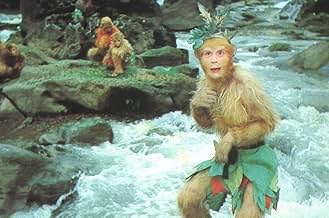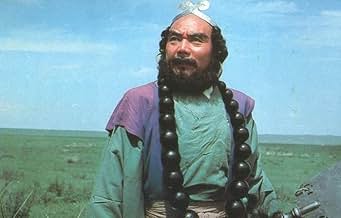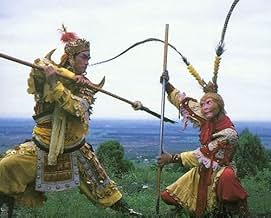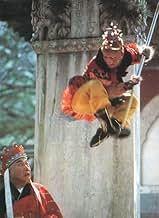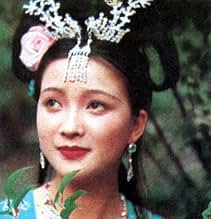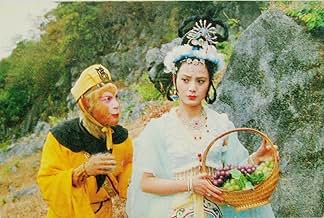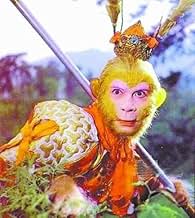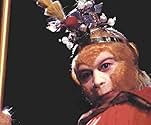IMDb-BEWERTUNG
8,7/10
1936
IHRE BEWERTUNG
Die legendäre lange Pilgerreise des buddhistischen Mönchs Tang Shen aus der Tang-Dynastie, der in die westlichen Regionen Zentralasiens und Indiens reiste, um heilige buddhistische Texte zu ... Alles lesenDie legendäre lange Pilgerreise des buddhistischen Mönchs Tang Shen aus der Tang-Dynastie, der in die westlichen Regionen Zentralasiens und Indiens reiste, um heilige buddhistische Texte zu erhalten.Die legendäre lange Pilgerreise des buddhistischen Mönchs Tang Shen aus der Tang-Dynastie, der in die westlichen Regionen Zentralasiens und Indiens reiste, um heilige buddhistische Texte zu erhalten.
- Auszeichnungen
- 6 wins total
Folgen durchsuchen
Empfohlene Bewertungen
The 86 edition journey to the west is the crystallization of Chinese traditional culture, which moves generations with its simple artistic style. Many people think that classics can't be broken through, and remaking is just in vain, but I don't think so. The reason why classics become classics is that this play, based on the idea of art concept from the beginning, presents us a good play with limited capital and limited technology under such tough conditions. It's a matter of attitude. It took four years to shoot the 86 version of journey to the West. It's hard for today's crew to do it on the spot in most of China. 86 version brings us a simple artistic style, rather than a strong visual stimulation through computer design. Never before, I hope there will be someone coming.
If you enter Journey to the West, you will get two financially successful films that were made several years after this one. Those films are junk; Hollywood-imitation garbage by talentless Chinese producers who care nothing about the real history and culture of China. They are out to just make a buck by exploiting perhaps one of the most courageous Buddhist practitioners in Chinese history. The Upanishads were actually the foundation of these sutras, but that small fact is basically irrelevant; the film is about faith, and the strength it gives the true believer. I am not a Buddhist or a religious individual (Philosophical Taoist), but I value the actions of those who live out the true values of their various religions by performing acts of kindness and humanity. This is one of those films. Remember, see the 1986 version of the film.
This is a classic TV series, is the adaptation of Chinese classical classics, the myth of the world is very exciting
10vp-68182
**Review of "Journey to the West" (1986)**
"Journey to the West" (1986) is a legendary Chinese television series that brings the classic novel by Wu Cheng'en to life with remarkable accuracy and charm. This series has left an indelible mark on the hearts of viewers, transcending generations and becoming a cultural icon in China and beyond.
The show follows the epic journey of the monk Tang Sanzang and his three disciples-Sun Wukong (the Monkey King), Zhu Bajie (Pigsy), and Sha Wujing (Sandy)-as they travel westward in search of Buddhist scriptures. Along the way, they encounter numerous trials, demons, and temptations, all while showcasing themes of loyalty, perseverance, and the struggle between good and evil.
One of the most notable aspects of this series is its faithful adherence to the original text. The show's creators managed to capture the essence of the novel, retaining its humor, moral lessons, and mythological elements. The performances, particularly by Liu Xiao Ling Tong as Sun Wukong, are unforgettable. Liu's portrayal of the mischievous yet righteous Monkey King is widely regarded as one of the best in television history.
The special effects, while primitive by today's standards, were groundbreaking at the time and added a layer of magic to the show. The vivid costumes, elaborate set designs, and traditional Chinese music further immerse the audience in the world of ancient mythology.
What makes "Journey to the West" (1986) truly special is its ability to appeal to audiences of all ages. Children are captivated by the action and fantasy, while adults appreciate the deeper philosophical and cultural themes. It is a show that entertains while also offering profound insights into Chinese culture and spirituality.
In conclusion, "Journey to the West" (1986) is a timeless masterpiece that stands as one of the greatest adaptations of Chinese literature. Its enduring popularity is a testament to its quality, and it remains a must-watch for anyone interested in Chinese culture, mythology, or classic television.
"Journey to the West" (1986) is a legendary Chinese television series that brings the classic novel by Wu Cheng'en to life with remarkable accuracy and charm. This series has left an indelible mark on the hearts of viewers, transcending generations and becoming a cultural icon in China and beyond.
The show follows the epic journey of the monk Tang Sanzang and his three disciples-Sun Wukong (the Monkey King), Zhu Bajie (Pigsy), and Sha Wujing (Sandy)-as they travel westward in search of Buddhist scriptures. Along the way, they encounter numerous trials, demons, and temptations, all while showcasing themes of loyalty, perseverance, and the struggle between good and evil.
One of the most notable aspects of this series is its faithful adherence to the original text. The show's creators managed to capture the essence of the novel, retaining its humor, moral lessons, and mythological elements. The performances, particularly by Liu Xiao Ling Tong as Sun Wukong, are unforgettable. Liu's portrayal of the mischievous yet righteous Monkey King is widely regarded as one of the best in television history.
The special effects, while primitive by today's standards, were groundbreaking at the time and added a layer of magic to the show. The vivid costumes, elaborate set designs, and traditional Chinese music further immerse the audience in the world of ancient mythology.
What makes "Journey to the West" (1986) truly special is its ability to appeal to audiences of all ages. Children are captivated by the action and fantasy, while adults appreciate the deeper philosophical and cultural themes. It is a show that entertains while also offering profound insights into Chinese culture and spirituality.
In conclusion, "Journey to the West" (1986) is a timeless masterpiece that stands as one of the greatest adaptations of Chinese literature. Its enduring popularity is a testament to its quality, and it remains a must-watch for anyone interested in Chinese culture, mythology, or classic television.
A whole sky of childhood.
Film is both thrilling, philosophical, and witty.
Each episode is a vivid story.
Actors are more than amazing.
Create the standard character image.
Magnificent view.
Profound dialogue.
"It is not known whether the Bodhisattva became a Youkai or the Youkai turned into a Bodhisattva."
Each view is very interesting.
Wusstest du schon
- VerbindungenReferenced in Detective Chinatown II (2018)
Top-Auswahl
Melde dich zum Bewerten an und greife auf die Watchlist für personalisierte Empfehlungen zu.
- How many seasons does Journey to the West have?Powered by Alexa
Details
Zu dieser Seite beitragen
Bearbeitung vorschlagen oder fehlenden Inhalt hinzufügen

Oberste Lücke
By what name was Journey to the West (1986) officially released in India in English?
Antwort
